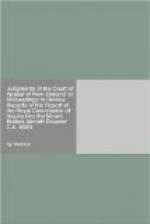We are not concerned with whether or not the Commissioner’s implied criticism of the Chief Inspector’s report is correct. The complaint made by the applicants is that the criticisms of Mr Davis in the two paragraphs that we have set out are based on mistake of fact, not on evidence of probative value. It is also said that he was not given a fair opportunity to put his case in relation to such findings, but what the applicants most stress is the way in which the Commissioner dealt with the evidence.
In particular they point out that the evidence of Mr Davis, not contradicted by any other evidence and correctly summarised in paragraph 45 of the Commissioner’s report, was that only copies of existing documents were to be destroyed; that he did not want any surplus document to remain at large in case its contents were released to the news media by some employee of the airline; and that his instructions were that all documents of relevance were to be retained on the single file. Their counsel submit in effect that in converting this direction for the preservation of all relevant documents into a direction for the destruction of ‘irrelevant’ documents—a word used by the Commissioner as if it were a quotation from Mr Davis—the Commissioner distorted the evidence. And it is said that the description ’one of the most remarkable executive decisions every to have been made in the corporate affairs of a large New Zealand company’ is, to say the least, far-fetched.
Counsel for the applicants point also to the fact that there is no evidence that any document of importance to the inquiry was destroyed in consequence of the instructions given by Mr Davis. The gist of the contrary argument presented by Mr Baragwanath was that Mr Davis was fully cross-examined about his instructions; and that ’it was open to the Royal Commissioner to find that there were in existence documents which never found their way to that file and that the procedures were tailor made for destruction of compromising documents’.
Alteration of Flight Plan
Paragraph 255 (e) and (f), in numerical order the next passages complained of, refer to the fact that when the co-ordinates in the Auckland computer were altered a symbol was used which had the effect of including in the information to be sent to the United States air traffic controller at McMurdo Station the word ‘McMurdo’ instead of the actual co-ordinates (latitude and longitude) of the southernmost waypoint. The Commissioner said:
(e) When the TACAN position [a navigational aid at McMurdo Station enabling aircraft to ascertain their distance from it] was typed into the airline’s ground computer in the early morning of 28 November 1979, there was also made the additional entry to which I have referred, which would result in the new co-ordinates not being transmitted to McMurdo with the Air Traffic Control flight plan for that




